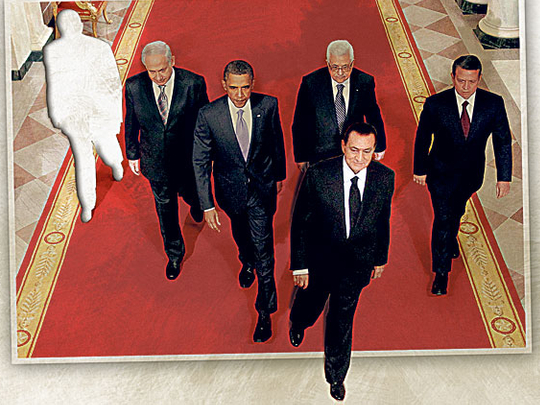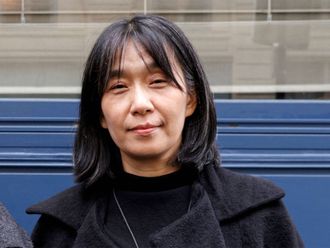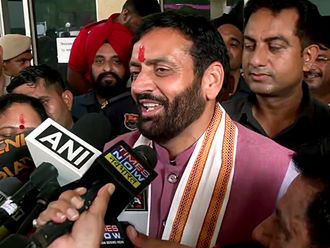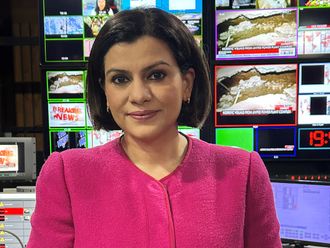
The Egyptian newspaper Al Ahram, founded in 1876, is one of the oldest in the Arab world, with a circulation of 800,000 and over 5 million readers. So what is my beef with this seemingly august institution? I'll tell you.
Al Ahram is not only owned and controlled by the government, but it is a newspaper that does not consider itself above fabricating news in order to mobilise support and admiration for those in power, even when that fabrication borders on the absurd.
Recently, the paper ran a photo showing Egyptian President Hosni Mubarak at the White House leading the US President Barack Obama, Jordan's King Abdullah, the President of the Palestinian National Authority Mahmoud Abbas, and Israel's Prime Minister Benjamin Netanyahu as they ceremoniously walked down a red carpet on the eve of the peace summit on September 1.
Clearly, the message that the paper was conveying to its readers, if only subliminally, was that Egypt, which at one time had made itself a major player in the Arab world by insisting on its own importance, continues to be considered so in the person of its president. So what is the issue? The problem is the photo was doctored. The original photo shows Obama leading the group, with Mubarak well behind.
You may shrug that off with the resigned and cynical exclamation: "A gaffe that is small potatoes, hardly the hook for a weekly column. So come on, let's move on."
Hello, those of us engaged in the journalistic enterprise take the incident very seriously indeed. This is the case of a major publication encroaching on the sanctity of our craft, not to mention violating the right of a citizen to be presented with facts, and only facts. A newspaper that cannibalises its own values, that tampers with "the rough draft of history", debases and cheapens the right of citizens to know what is happening around them, rendering them an ill-informed or, worse, mis-informed polity.
In some countries in the Arab world — or put more bluntly, in many countries in that world — the press is monitored or muzzled to the point where it has become not a watchdog over, but a lapdog of, the authorities. The government line is enforced by reporters who engage in self-censorship and editors who not only can easily guess what issues that government wants and does not want aired, but how they are aired.
Not a week passes by without this columnist, who is on the mailing list of the New York-based Committee to Protect Journalists, alerting him about Arab editors, reporters, commentators and intellectuals, all the way from Morocco to Egypt, Iraq to Jordan, being arrested, fined, convicted, imprisoned, even at times gunned down, for writing articles deemed by the authorities as ‘inflamatory', ‘inciteful', ‘insulting to the dignity' of the head of state, and the rest of it.
A muzzled media is a disaster for any society. Journalists, constrained by rules imposed on them by men with guns and keys to a prison cell, will produce not only contrived accounts of current events, but lots of bad journalism. I say the crisis of Arab culture today is a crisis of journalism, a journalism prevented from living up to its name.
Here's a recollection of an egregious incident from the battlefield. In 1995, I happened to be in the West Bank on a writing assignment, coinciding with the arrival in the Occupied Territories of the Palestine Liberation Organisation, then its reincarnation as the Palestinian National Authority (PNA). The incident in question concerned the editor of Al Quds newspaper, who had omitted to splash a story dealing with the PNA leader on page one, and instead relegated it to the inside pages. Then like thieves in the night, a group of masked thugs barged into the editor's offices in Occupied Jerusalem and terrorised the man and his staff.
When the story made it on the pages of the American and European newspapers, PNA officials stated lamely that the masked men "were not masked at all" and, what's more, they were there to "collect taxes". Other incidents followed, including the one in March 2001, when the Al Jazeera bureau was shut down in the West Bank after it was revealed that the TV network planned to air a documentary on the Lebanese civil war that, in some of the segments, allegedly showed Yasser Arafat in an unflattering light.
Again, I say a free press is a necessary function of a free, dynamic society, where in the marketplace of ideas, the best ideas predominate in the public discourse, leading to the enlargement of a citizen's compass of awareness. The opposite of that is a censored press — with censorship being like a snail that leaves a trail of slime behind it — whose goal is the standardisation of political thought through an ethic of fear and regimentation.
A press like that is not only unutterably dull to wade through, but a press that evinces no respect for the value of ideas in human affairs.
All this on top of the fact that those who run this charade in our part of the world insult our intelligence when they assume that, in this globalised world of instant communication, it is difficult for us to discern a clumsily doctored photo when we see one.
In an editorial last week, the editor-in-chief of Al Ahram, responding to criticism, brazenly wrote that his newspaper did nothing wrong. Really. Honest. He opined alliteratively: "The expressionist photo is a brief, live and true expression" of the Egyptian President's "leading" role in promoting the Palestinian cause. You get the idea. So let's move on.
Fawaz Turki is a journalist, lecturer and author based in Washington. He is the author of The Disinherited: Journal of a Palestinian Exile.











